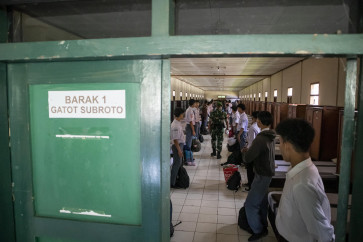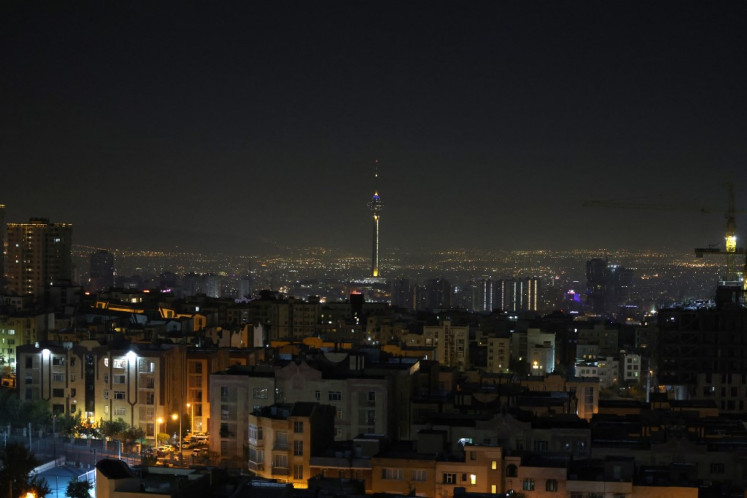‘Wayang kulit’ demonstrates Indonesia’s resilient culture
Protests against the perceived assault on wayang kulit (traditional shadow puppetry) are the manifestation of continuing fear about the dissemination of ideologies promoting global Islam.
Change text size
Gift Premium Articles
to Anyone

A
conservative Wahhabist religious preacher, Khalid Basalamah has sparked controversy after a statement he made a couple of years ago recently went viral. He made the remarks during a question-and-answer session following his regular speech at a South Jakarta mosque.
In response to a question from a Javanese participant, Basamalah insisted that wayang kulit (traditional shadow puppetry) needed to be destroyed because the cultural performance was against Islamic values.
The statement alarmed the public, who feared that such words would be detrimental to the material culture and arts inherent in wayang kulit, which is considered integral to Indonesian culture, especially for the Javanese. Indonesians also fear that this is a manifestation of conservative Wahhabi ideology flexing its muscle against autochthonous Indonesian culture.
A wide range of community groups have expressed discontentment over the statement, calling for the religious figure to be wiser. Abdul Mu’ti, secretary-general of Indonesia’s second-largest Muslim organization, Muhammadiyah, argues that wayang kulit is an effective tool to promote Islamic values as it is part of local culture and wisdom. An activist with the influential semi-state body, the Indonesian Ulema Council (MUI), said Basalamah needed to be more mindful in his comments.
All these protests against the perceived assault on wayang kulit are the manifestation of continuing fear about the dissemination of ideologies promoting global Islam, which include Wahhabism and Tarbiyah, since the 1980s, and which have been followed by Salafi and Islamic caliphate movements. The dissemination of global Islam coincided with the advent of worldwide Islamic revivalism in the 1970s, which also affected Indonesia.
As a result, the values of global Islam have increasingly been affecting the social, ethical and spiritual lives of substantial numbers of Indonesians, evoking fears of growing intolerance and extremism in the diverse nation. Some surveys have warranted these fears, showing rising intolerance and extremism among professionals and both non-tertiary and university students since the 1998 reform.
Concerns over rising intolerance and extremism have also been voiced by moderate Muslims and government officials, including President Joko “Jokowi” Widodo. Are all these fears justified?
The wayang kulit controversy is a prime example of the war of ideas between Indonesians who subscribe to syncretic culture and those who wish to modify or even destroy syncretic culture in the name of religious purification that aims to eradicate elements deemed un-Islamic in Muslim societies. Wayang kulit, which was heavily influenced by Hindu culture, was immensely popular before Islam’s arrival to Java.
The Wali Songo (Nine Saints), the nine preachers who were often said to have contributed significantly to the propagation of Islam in Java, initially had different standpoints toward this show. Some expressed opposition to wayang kulit because they deemed it contrary to Islamic values and principles. Others, including Sunan Kalijaga, leveraged the show to effectively disseminate Islamic values to the majority of Java’s population, who still subscribed to Hindu-Buddhist-Animist beliefs.
After some discussions with the first Demak sultan, Raden Patah, the Wali Songo reached a consensus to respect the local tradition by not prohibiting people from enjoying the show. Also, they acculturated wayang kulit in alignment with Islamic values. Since Islam prohibits material culture resembling the anatomy of human beings, the Wali Songo modified the puppet designs to represent various characters, in a manner that made them less anthropomorphic in shape.
For example, they exaggerated the length of the puppets’ noses. They preserved Hindu-influenced storylines taken from the Mahabharata or Ramayana epic, but they introduced a band of characters that symbolized the pillars of Islam. The Pandawa Lima, five siblings who represent protagonist characters, symbolize the five pillars of Islam.
The sociohistorical exchange and interaction between Indonesian culture and Islam was a two-way process, where the gradual Islamization of wayang kulit was accompanied by the indigenization of Islamic elements.
Similar to cultural performances everywhere, there have been continuities and changes in the ways the wayang kulit show is prepared and run. Some puppet masters perform using Indonesian, and others modify the plots of Mahabharata or Ramayana epic.
In 1986, a puppet master in Klaten regency, Central Java, radically modified the show to make it more acceptable to Muhammadiyah members. This was because some of the members of this modernist Muslim organization resisted the show, as they thought that it was full of fantasies (tahayul), heretical innovations (bid’ah) and superstitions (churafat).
To make it more popular among Muhammadiyah members, the puppet master, Suryadi, sinden (female singers) and gamelan instrument players, wore Muslim attire. This type of wayang kulit is popularly called wayang sadat, which indicates the dynamism in which the show transforms in accordance to the different religious orientations of audiences, while retaining its resilient syncretic kernel.
The development of wayang kulit above proves the show has survived various ideological onslaughts. Its survival is rooted in the deep-seated syncretic mindset among Indonesians. This syncretic mindset has been slowly developed and firmly embedded in the beliefs, ideas and practices of Indonesians, resulting in a highly syncretized Indonesian culture, which is not easily swayed by the arrival of new ideologies.
The syncretic culture, which tends to be accommodative, tolerant and inclusivist toward various ideological strains and cultural elements, serves as a bulwark against, among other things, global narratives of Islam that tend to be exclusive, intolerant, rigid, absolute and divisive. Indonesia's historical and current bent towards syncretization has contributed to wayang kulit’s preponderance and Indonesia’s moderate religious outlook.
New global Islam ideologies, including Wahhabism propagated by Basalamah, might seep into this syncretic culture, contest it straightforwardly or even tries to usurp it, but as the development of wayang kulit shows, they can never dominate or annihilate it.
In his journal article titled “Dakwah and Indigenous Culture: The Dissemination of Islam”, scholar Kees van Dijk aptly comments that “the dissemination of Islam in the Indonesian archipelago shows that local culture in such instances is usually more resilient than is often assumed”.
While this might seem like a culturalist explanation, there are also structural and institutional forces such as Nahdlatul Ulama, MUI and even some elements within Muhammadiyah who strive to keep the syncretic and autochthonous culture intact, through various initiatives such as the promotion of local wisdom and culture. This helps explain why, despite the increasing presence of the Wahhabi ideology here since the 1980s, it has still failed to be a dominant religious orientation here in Indonesia.
Given the resiliency of the Indonesian syncretic culture, fears over the Wahhabization of Indonesia are overrated. Any attempt to infiltrate or to destroy this culture will meet severe public backlash, as shown by the mounting protests against Basalamah’s statement.
***
A’an Suryana is a visiting fellow at the ISEAS-Yusof Ishak Institute, Singapore, where Faris Ridzuan is a research officer.









